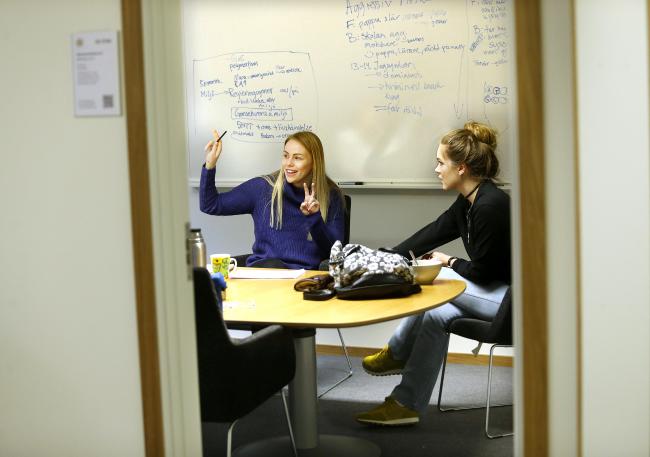Supervision, general syllabus, individual studyplan and degree
All doctoral students are appointed at least two supervisors in connection with their admission to the doctoral programme who will provide help and support during the education period up to the thesis defence and graduation.

SUPERVISION
New doctoral students shall be appointed a main supervisor and at least one assistant supervisor and at least one of them must have completed supervisor training. As a general rule, the main supervisor should be a docent or professor.
The main task of the supervisors is to share their knowledge and experience and help the doctoral student develop into an independent researcher with a scientific approach. The contact between the doctoral student and the supervisors is usually most intense at the beginning when you plan the studies and the doctoral student embarks upon their research work, as well as at the end of the studies when the thesis is to be completed.
GENERAL SYLLABUS
Each subject must provide an overall plan for their third-cycle education, also referred to as a general syllabus. This includes information about specific entry requirements, the intended learning outcomes, the structure and content of the programme, the courses included, etc. The general syllabus can be found on the website of each subject.
INDIVIDUAL STUDY PLAN
At the start of the studies the doctoral student shall, in consultation with their supervisors, draw up an individual study plan. The plan should include a realistic time plan for coursework, thesis work and supervision. It should also include an introduction to the proposed research field, aim and problem, as well as relevant ethical considerations. The individual study plan is subject to continual review, at least once a year.
DOCTORAL THESIS AND THESIS DEFENCE
The thesis is published in the university’s official publication series Karlstad University Studies. Once the thesis is printed and ready, it is presented at a public thesis defence.
Before the defence, an opponent, examining committee and chairman of the defence procedures are appointed. The opponent or doctoral student begins with a presentation of the subject and the thesis and the results. The opponent then leads a discussion on scientific relevance, methods and results and the doctoral student orally defends their thesis. The members of the examining committee and the audience are also given the opportunity to ask questions to the doctoral student.
If the doctoral student chooses to pursue a licentiate degree, the thesis is called a licentiate thesis. The doctoral student will then defend their thesis at a licentiate seminar.
DEGREE
In order to be awarded the title of doctor, the doctoral student must complete a degree comprising at least 240 credits. For a doctoral degree, the doctoral student is required to pass the exams included in the programme, as well as being awarded a pass grade for a doctoral thesis of at least 120 credits. If the doctoral student chooses to study for two years, instead of four, he or she can instead finish with a licentiate degree of 120 credits, including a licentiate thesis of at least 60 credits. In order to have a degree awarded, the doctoral student must always submit an application for a certificate to the university.
DOCTORAL AWARD CEREMONY
The doctoral award ceremony is the big academic celebration where doctoral students who have been awarded their doctoral degree receive the so-called insignia: a ring, diploma and hat or laurel wreath. The doctoral student pays for the ring and hat.
AFTER GRADUATION
Students who have been awarded a doctoral or licentiate degree generally establish themselves quickly on the labour market, and the majority of graduates find employment in the public sector. Universities and university colleges are the main employers. A smaller proportion of graduates find work in the private sector.
Postdoctoral research gives new doctors the opportunity to gain further experience as researchers. It is possible to do a postdoc in Sweden or abroad, at a university or research institute. After a postdoctoral appointment, you can apply for positions as an associate senior lecturer, which is a career-development position for graduates with a third-cycle degree who are interested in pursuing an academic career.

